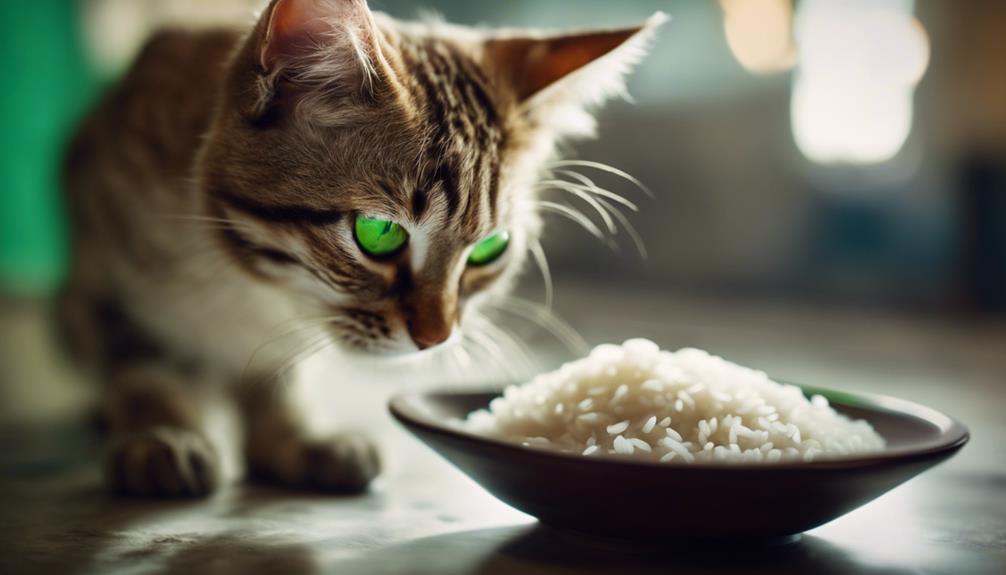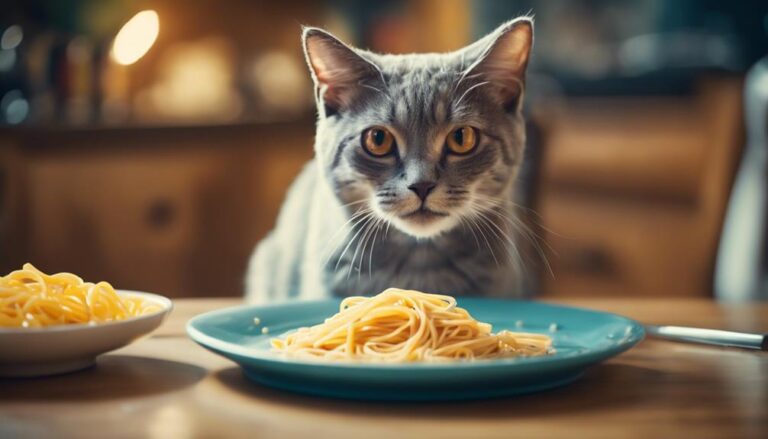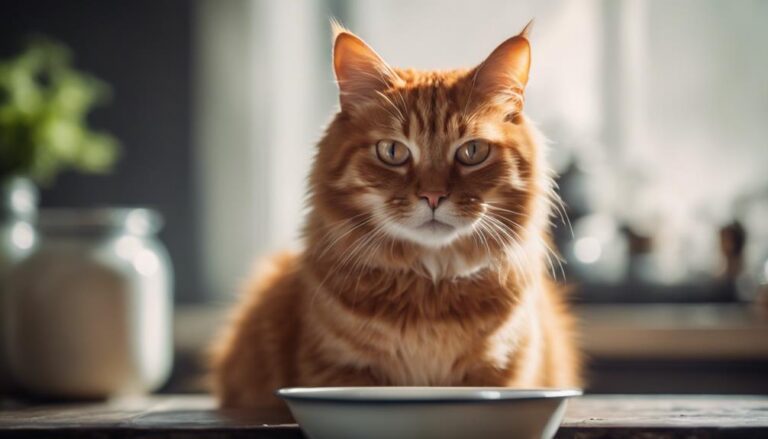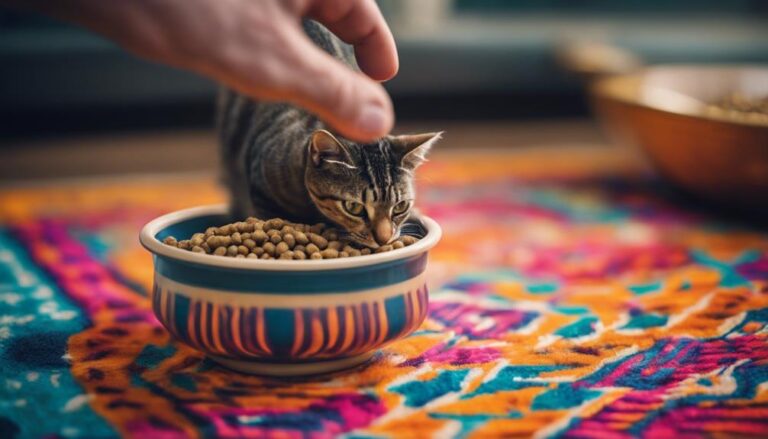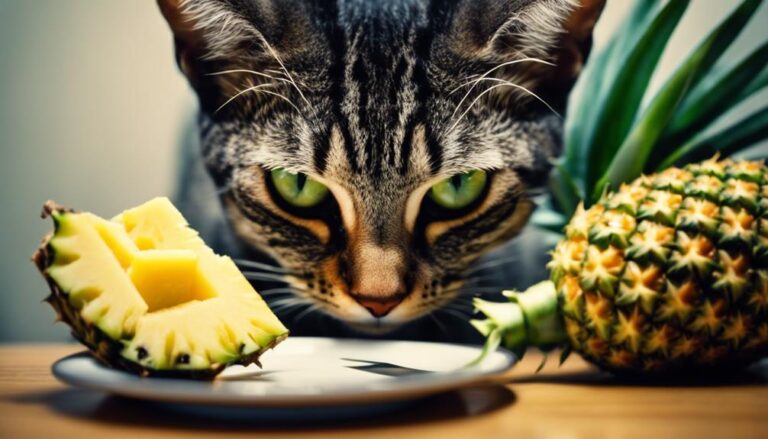If you've ever wondered whether cats can eat rice and if it's beneficial for them, the answer isn't as straightforward as you might think. While cats can consume rice in moderation, there are factors to consider when determining if it's a healthy choice for your feline companion. Before you make any decisions about incorporating rice into your cat's diet, it's essential to explore the nutritional aspects and potential risks associated with this common human food. By understanding the implications, you can better assess whether rice aligns with your cat's dietary needs and overall well-being.
Nutritional Value of Rice for Cats
When considering the nutritional value of rice for cats, it's essential to understand the key differences between brown and white rice. Brown rice is packed with fiber, protein, Vitamin B1, Vitamin B6, iron, and magnesium, offering a nutrient-rich option for your feline friend. On the other hand, white rice, being processed, lacks the essential nutrients found in brown rice. The bran, germ, and endosperm present in brown rice provide more vitamins and minerals compared to white rice, making it a healthier choice for your cat.
While rice can be beneficial for cats in small amounts, it shouldn't replace a balanced and complete cat food diet. It's crucial to consult a veterinarian before incorporating rice into your cat's meals to ensure it aligns with their specific nutritional needs. By adding rice to your cat's diet in moderation and alongside a well-balanced cat food, you can provide them with additional nutrients and variety while keeping their diet healthy and complete.
Brown Vs. White Rice for Cats
In comparing brown and white rice for cats, brown rice emerges as the superior choice due to its higher nutrient content and natural vitamins and minerals.
Brown rice is a whole grain that retains its outer layers, where most nutrients are found, making it a good choice for your pet's diet. On the other hand, white rice loses a significant portion of its nutrients during processing, which makes it less beneficial for cats.
Brown rice contains essential vitamins and minerals that contribute to your cat's overall health when included in their balanced diet. While white rice is often enriched with added nutrients like vitamins and iron, it still doesn't match the natural goodness found in brown rice.
Therefore, when deciding between brown and white rice for your cat, opt for brown rice to ensure your feline friend gets the best possible nutrition from their food.
Feeding Rice to Cats With Digestive Issues
If your cat is experiencing digestive issues, consider incorporating rice into their diet as it's highly digestible and gentle on their stomach. Rice can help with digestive upsets in cats due to its easy digestibility.
However, it's essential to remember that rice alone doesn't provide a complete and balanced diet for your cat. Before making any dietary changes, especially if your cat has digestive problems, consult your vet for guidance.
While rice can temporarily aid in soothing your cat's stomach, transitioning them to a well-balanced, highly digestible cat food is crucial for their long-term digestive health. This will ensure they receive the right balance of essential nutrients necessary for their overall well-being and maintain optimal cat health.
Rice as an Occasional Cat Treat
You may wonder about feeding your cat rice as a special treat. Moderation is key when offering rice to your feline friend.
Be cautious of potential digestive issues that may arise from giving your cat large portions of rice.
Rice for Cats' Diet
When considering incorporating rice into your cat's diet, remember that it should only be given as an occasional treat due to its lack of essential nutrients for felines. Cats are obligate carnivores, meaning they don't require rice in their diet to thrive.
While rice can be offered in small amounts as an occasional treat, it shouldn't make up a significant part of their diet due to its lack of necessary nutrients. If you're considering using rice to address digestive issues in your cat, it's crucial to consult a vet beforehand to ensure it's the appropriate course of action.
Remember that moderation is key when it comes to including rice in your cat's diet.
Moderation Is Key
Incorporating rice into your cat's diet should be done in moderation as an occasional treat. When considering treats for your cat, keep in mind the following:
- Essential Nutrients: Rice lacks essential feline nutrients, so it shouldn't replace complete cat food.
- Small Amounts: Giving your cat small amounts of rice is acceptable, but it should be minimal.
- Diet Balancing: Feeding cats too much rice may lead to a lack of essential nutrients in their diet.
Potential Digestive Issues
Occasionally giving your cat rice as a treat can lead to potential digestive issues if not done in moderation. Cats may experience stomach discomfort if rice is consumed in large amounts. To prevent digestive problems, introduce rice slowly and in small quantities as an occasional treat.
It's crucial to monitor your cat for any signs of digestive issues after consuming rice. Consulting a vet before incorporating rice into your cat's diet can help ensure their digestive health is maintained.
Risks of Feeding Rice to Cats
Feeding rice to your cat can potentially lead to digestive issues like upset stomach or diarrhea.
You may also expose your cat to risks of developing nutritional imbalances due to the lack of essential nutrients in rice.
Allergic reactions are another concern when feeding rice to your feline friend.
Digestive Issues in Cats
During digestive issues, cats may benefit from rice due to its high digestibility, but it should only be a temporary solution. Here are some key points to keep in mind:
- Feeding rice to cats with upset stomachs can help soothe their digestive troubles.
- Too much rice can lead to vomiting or diarrhea in cats with digestive issues.
- Consulting a vet is crucial if your cat experiences persistent stomach problems.
Nutritional Imbalance Concerns
When considering the risks of feeding rice to cats, it's important to be aware of potential nutritional imbalances that can arise. Cats require a balanced diet rich in essential nutrients, which may not be provided by rice alone.
Excessive consumption of rice can lead to deficiencies in vital vitamins and minerals necessary for your cat's health. If rice becomes a significant part of their diet, cats may lose interest in their commercial pet foods, further exacerbating the nutritional imbalance.
It's crucial to consult a vet before incorporating rice into your cat's diet to avoid potential health risks associated with inadequate nutrition. Ensuring your cat's diet is well-balanced with appropriate cat foods will help prevent any nutritional deficiencies and promote their overall well-being.
Allergic Reactions Possibility
Considering the potential risks of incorporating rice into your cat's diet, it's important to be aware of the possibility of allergic reactions.
- Allergic reactions to rice in cats are rare but possible.
- Symptoms of rice allergies in cats may include itching, skin redness, or gastrointestinal upset.
- Severe allergic reactions in cats may lead to breathing difficulties or anaphylaxis.
If you notice any of these symptoms after feeding your cat rice, consult a vet immediately. It's crucial to avoid feeding rice to your cat if they show signs of an allergic reaction. Prioritize your cat's health and well-being by being vigilant about potential allergic responses to rice in their diet.
Conclusion: Rice in a Cat's Diet
Including rice in your cat's diet should be approached with caution due to its lack of essential feline nutrients. While cats can eat rice in small quantities, it shouldn't be a significant portion of their diet. Cats are obligate carnivores, meaning they primarily need meat in their diet to thrive.
Although cooked rice is non-toxic to cats and may offer some nutritional benefits like being a natural pesticide, it isn't a necessary component for a healthy feline diet. Commercial cat foods are formulated to provide a balanced diet for cats, focusing on their carnivorous nature.
While rice can be given as an occasional treat or to aid digestion in small amounts, it shouldn't replace a meal that's specifically designed for your cat's nutritional needs. To ensure your cat maintains a healthy diet, consult with your veterinarian for guidance on the most suitable food choices for your feline friend.
Frequently Asked Questions
Is Cooked Rice Good for Cats?
Cooked rice can be good for your cat in moderation. It lacks essential nutrients but is gentle on upset stomachs. Offer plain rice sparingly, as it provides easily digestible carbs. Consult your vet, especially if your cat has digestive issues.
Can I Feed My Cat Chicken and Rice Everyday?
You shouldn't feed your cat chicken and rice every day. It may lead to nutritional imbalances. Cats require a varied diet to meet their needs fully. Consult your vet for the best diet plan ensuring they get all necessary nutrients.
Can I Give My Cat a Piece of Rice?
You can give your cat a small piece of rice as an occasional treat. Ensure it's plain, well-cooked, and free of seasonings. However, rice should not be a major part of your cat's diet. Watch for any discomfort and consult your vet.
Is White Rice Good for Cats With Kidney Disease?
For cats with kidney disease, white rice can be a beneficial, easily digestible source of energy. Ensure to consult your vet for guidance on incorporating white rice into a kidney-friendly diet and monitor your cat's health closely.

